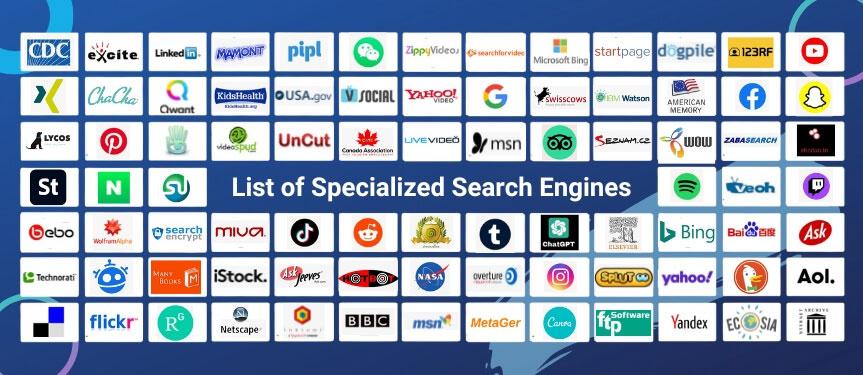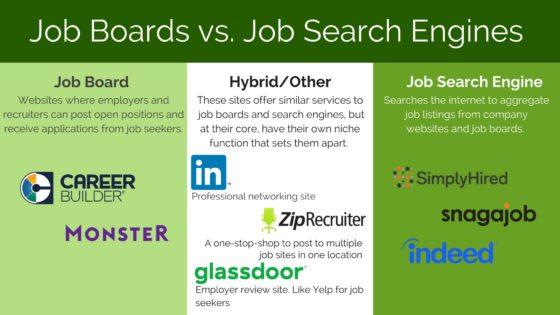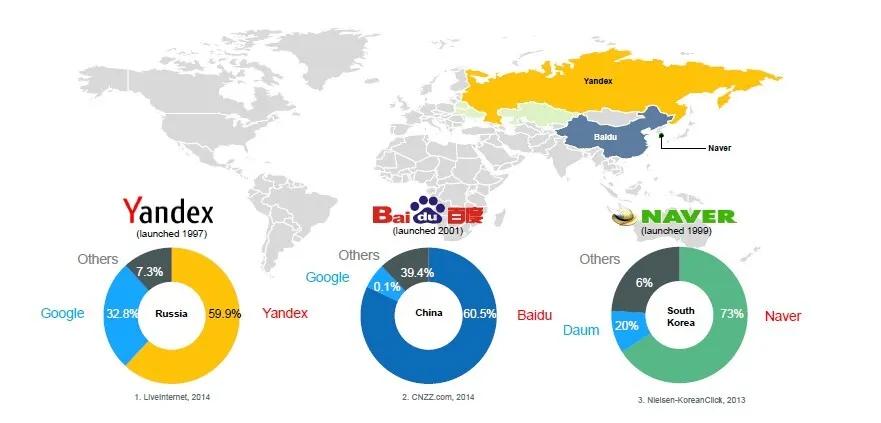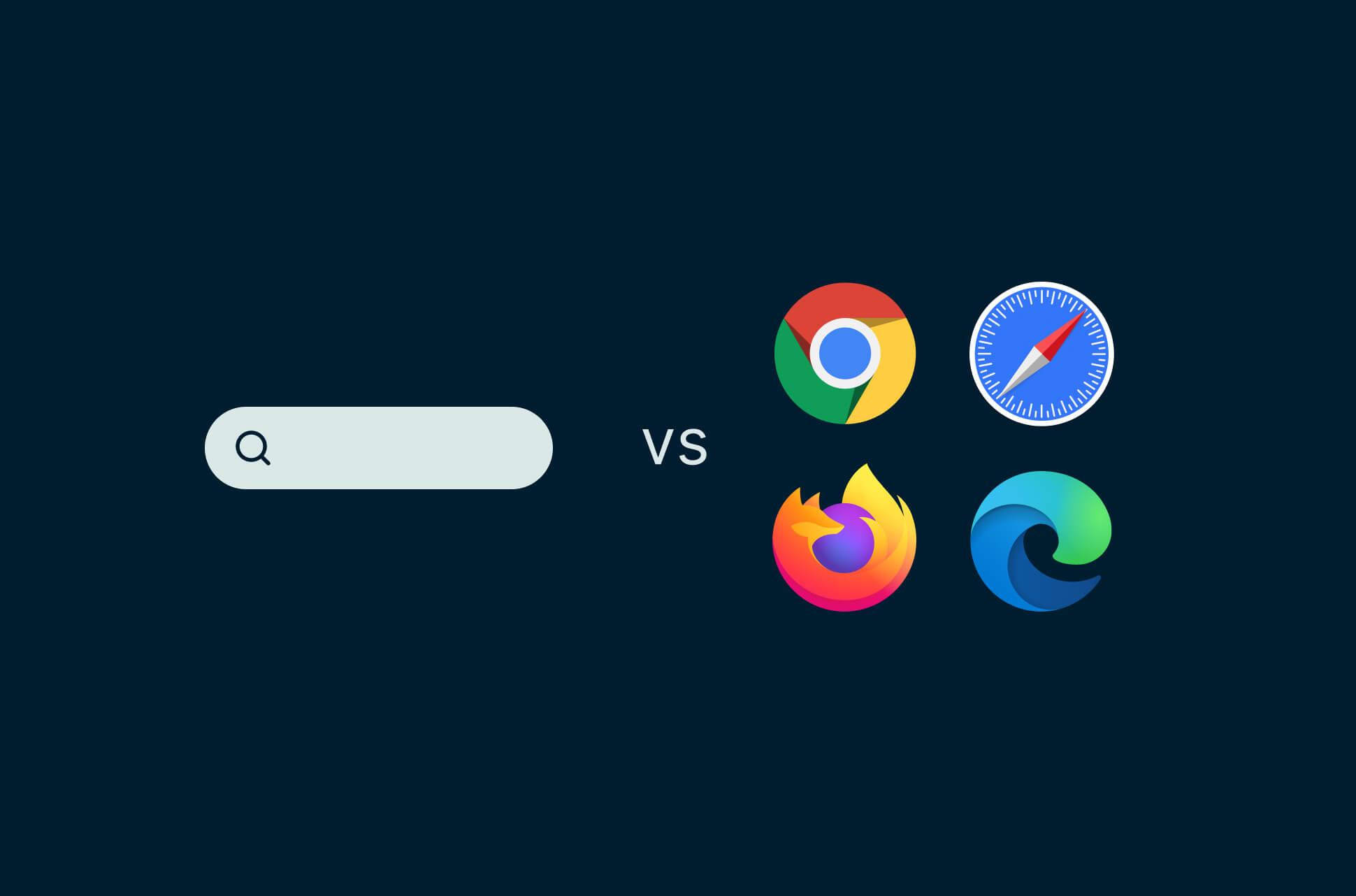Tired of the same old search results? Explore the world beyond Google! Discover unique perspectives and enhanced privacy with our top 11 search engines. Embrace a new way to find information that empowers your curiosity and sparks innovation!
11 Best Search Engines to Use Instead of Google
In a world where Google reigns supreme as the go-to search engine, it’s easy to forget that there are alternative pathways to knowledge and discovery waiting to be explored. While Google offers a vast ocean of information, it may not always be the best fit for every searcher’s needs. Whether you’re seeking enhanced privacy, specialized content, or simply a fresh perspective, the digital landscape is rich with innovative search engines that can transform the way you find information. In this article, we will uncover the 11 best search engines to use instead of Google, each offering unique features designed to empower you on your quest for knowledge. Embrace the opportunity to broaden your horizons and diversify your search experiences—because the internet is full of possibilities just waiting to be discovered. Let’s embark on this journey together and unlock the full potential of the web!
Exploring Alternatives to Google for a More Diverse Search Experience
In a digital landscape dominated by a single search engine, exploring alternatives can open up a world of possibilities. Embracing diverse search tools not only enhances your online experience but also empowers you to discover information that might otherwise be overlooked. Each search engine has its unique strengths, catering to various interests, privacy concerns, and user preferences. Here are some compelling options to consider:
- DuckDuckGo: This search engine prioritizes user privacy, ensuring that your searches remain anonymous. No tracking means no targeted ads, allowing for a more organic search experience.
- Bing: Microsoft’s offering is more than just a Google alternative; it features unique rewards programs and image search capabilities that can enhance your visual exploration.
- Startpage: Combining the search results of Google with privacy features, Startpage offers a familiar interface without the data collection, making it a great middle ground.
- Qwant: Based in Europe, Qwant emphasizes privacy while delivering a visually appealing search experience. It also has a dedicated section for news, social media, and even shopping.
Choosing a search engine tailored to your needs can transform the way you engage with the internet. Consider the following aspects when selecting your next go-to search tool:
| Feature | DuckDuckGo | Bing | Startpage | Qwant |
|---|---|---|---|---|
| Privacy Focused | ✔️ | No | ✔️ | ✔️ |
| Image Search | No | ✔️ | No | ✔️ |
| Ad-Free Experience | ✔️ | No | ✔️ | ✔️ |
| Local Results | No | ✔️ | No | No |
Venturing away from Google also means opening yourself up to different communities of users who share insights and perspectives unique to their chosen platforms. For instance, some search engines integrate social media results, allowing you to tap into real-time discussions and trends. This can significantly enrich your research or simply keep you informed about the latest happenings in your areas of interest.
Moreover, many of these alternatives support niche searches. Whether you’re hunting for academic articles, multimedia content, or specialized databases, there’s a search engine designed for that purpose. This specialization ensures that you get more relevant results tailored to your specific needs, rather than the generalized results often returned by a mainstream engine.
Ultimately, experimenting with different search engines can lead to a more fulfilling and diverse search experience. By embracing these alternatives, you not only enhance your personal search journey but also contribute to a healthier internet ecosystem where multiple voices and services can thrive. Each search begins with a question; why not broaden your horizons with the tools that best suit your quest for knowledge?

Unlocking Hidden Gems: Discovering Lesser-Known Search Engines
As we navigate the vast expanse of the internet, the allure of Google often overshadows countless other valuable resources. However, a treasure trove of lesser-known search engines awaits those willing to venture off the beaten path. Each of these platforms offers unique features that cater to specific needs, providing a refreshing alternative to the mainstream. Embrace the opportunity to explore the uncharted territories of the web and unlock a world of hidden gems.
Consider the power of privacy-focused search engines. With growing concerns about data security, platforms like DuckDuckGo and Startpage offer robust alternatives that respect user privacy while still delivering relevant search results. These engines do not track your searches, ensuring a more secure browsing experience. You can find information without the feeling of being followed, allowing for a more liberating search journey.
For those passionate about specific niches, there are search engines tailored to specific interests. For instance, Wolfram Alpha is a computational knowledge engine that excels at answering factual queries and performing complex calculations. Whether you need data analysis or mathematical solutions, this tool is an indispensable resource for students and professionals alike. Similarly, BoardReader specializes in searching forums and message boards, making it ideal for discovering community insights and discussions that often go unnoticed.
If you’re yearning for a more visual and interactive search experience, consider using Bing Visual Search or Pinterest. Both platforms prioritize images over text, allowing users to search using photos or find inspiration through visually appealing content. This approach not only enhances user engagement but also uncovers a wealth of creative ideas that might be missed in traditional search results.
Moreover, local search engines can help you tap into community-specific content. Yelp and Yellow Pages are perfect for discovering local businesses, restaurants, and services tailored to your geographical area. These platforms offer user-generated reviews and ratings, connecting you with the best local options, whether you’re looking for a cozy café or a reliable mechanic. By utilizing these tools, you enrich your local experience and support community establishments.
To illustrate the diversity among these search engines, consider the following table that highlights their unique functionalities:
| Search Engine | Primary Feature | Best For |
|---|---|---|
| DuckDuckGo | Privacy Protection | General Search |
| Wolfram Alpha | Computational Knowledge | Data Queries |
| Bing Visual Search | Image-Based Search | Visual Content |
| Yelp | Local Business Reviews | Local Services |
Stepping outside the Google bubble not only opens up new avenues for discovery but also empowers you to curate your search experience according to your needs. Each of these search engines holds the potential to transform how you interact with information online. So why not take the plunge? Embrace the journey of exploration and let these hidden gems lead you to unexpected treasures in the vast ocean of the internet.
Enhancing Privacy: The Importance of Using Secure Search Engines
In an era where data breaches and online surveillance are increasingly common, the need for privacy has never been more urgent. Each time you search for information on conventional search engines, your queries are tracked, logged, and often sold to advertisers. This reality not only compromises your personal information but also shapes the content you see, creating a filtered digital experience. Therefore, opting for secure search engines is becoming a crucial step toward reclaiming your online privacy.
Secure search engines prioritize user confidentiality by not storing search history or personal data. This means you can explore topics freely without the fear of being monitored or targeted by ads based on your previous searches. When you switch to a secure search engine, you’re taking an essential step to safeguard your digital footprint. Some of the benefits include:
- Anonymity: Your searches remain private and untraceable.
- Unbiased Results: Experience a broader range of content without algorithmic filtering.
- Enhanced Security: Many secure search engines use encryption to protect your data.
Additionally, many of these alternatives are built on a foundation of transparency, meaning they openly share their data policies with users. This level of accountability fosters trust and encourages a more ethical approach to browsing. Users can feel empowered, knowing they are not the product being sold but active participants in their online journey. For example, engines like DuckDuckGo and Startpage emphasize this principle by ensuring that user privacy remains at the core of their services.
Moreover, secure search engines often come with additional features that enhance your browsing experience. Some offer integrated tools for anonymous browsing, while others provide options for customized search settings. When evaluating secure search engines, consider features such as:
| Search Engine | Unique Feature |
|---|---|
| DuckDuckGo | Instant Answers without tracking |
| Qwant | Social search integration |
| Startpage | Google results with privacy |
Choosing a secure search engine is not merely a technical adjustment; it is a conscious choice to protect your privacy in a digital age that often neglects it. By making this switch, you contribute to a broader movement that values privacy rights and ethical online practices. Ultimately, embracing these tools can lead to a more liberated and enriching online experience, where you can explore ideas and information without the weight of surveillance hanging over you.

Boosting Your Research: Specialized Search Engines for Academic Needs
When it comes to academic research, relying solely on traditional search engines like Google can limit your results and obscure valuable resources. Thankfully, there exist specialized search engines designed specifically to cater to the unique needs of researchers, students, and academics. These platforms streamline your search process, helping you discover high-quality, peer-reviewed papers, articles, and data crucial for your studies.
Here are some noteworthy alternatives that can significantly enhance your research endeavors:
- Google Scholar: While still a Google product, this platform is tailored for scholarly content, providing access to a multitude of academic papers, theses, books, and conference proceedings.
- PubMed: For those in the medical and life sciences fields, PubMed offers a comprehensive database of references and abstracts on life sciences and biomedical topics.
- JSTOR: An invaluable resource for humanities and social sciences, JSTOR provides access to thousands of academic journals and books, making it easier to find historical perspectives and research trends.
- ERIC: The Education Resources Information Center is a premier database for education literature, offering a wealth of resources on education-related policy, practice, and research.
- BASE: The Bielefeld Academic Search Engine aggregates open access resources from repositories and website indexes, ensuring a broad and diverse array of scholarly materials.
Utilizing these specialized engines not only helps in finding relevant literature but also enhances the credibility of your research. Each platform offers unique features, such as advanced filtering options, citation tools, and direct access to full-text articles, allowing you to refine your search and gather high-impact resources efficiently.
To further illustrate the advantages, here’s a simple comparison table highlighting key features of some specialized search engines:
| Search Engine | Field of Focus | Key Feature |
|---|---|---|
| Google Scholar | General Academic | Comprehensive citation tracking |
| PubMed | Medical/Biomedical | Extensive peer-reviewed articles |
| JSTOR | Humanities/Social Sciences | Access to historical archives |
| ERIC | Education | Focus on education literature |
| BASE | Multidisciplinary | Open access aggregation |
Incorporating these specialized search engines into your academic toolkit can empower your research process. Move beyond generic search queries and tap into curated resources that meet the specific demands of your field, ultimately leading to better insights, innovative ideas, and success in your scholarly pursuits.

Finding Your Niche: Tailored Search Engines for Unique Interests
In the vast digital landscape, finding the right information can sometimes feel like searching for a needle in a haystack. While Google is often the go-to for many, there are search engines uniquely designed to cater to specific interests and communities. These niche platforms can streamline your search experience, helping you connect with the content that truly resonates with you. Here are some search engines that can help you delve deeper into subjects you are passionate about:
- DuckDuckGo: Emphasizing privacy, DuckDuckGo doesn’t track your searches, making it perfect for those who value anonymity while exploring unique topics.
- Yandex: This Russian search engine excels in providing localized results, ideal for users interested in Eastern European culture, language, and news.
- Wolfram Alpha: Rather than displaying a list of links, this computational engine provides answers to factual queries, making it invaluable for students and researchers.
- Seznam: A Czech search engine that offers a robust portal for local news, entertainment, and services, appealing to those interested in Czech culture.
- Startpage: Another privacy-focused option, Startpage uses Google’s search results but protects your personal information, perfect for those who want reliable results without the tracking.
Each of these search engines not only provides an alternative to the mainstream but also brings something special to the table. For instance, if you’re a history buff, you might prefer Archive.org, which specializes in historical documents, books, and web pages, allowing you to dive into the past like never before.
| Search Engine | Best For | Unique Feature |
|---|---|---|
| DuckDuckGo | Privacy-conscious users | No tracking or personal data usage |
| Wolfram Alpha | Students, researchers | Computational knowledge engine |
| Yandex | Localized searches in Eastern Europe | Extensive local services |
| Archive.org | History enthusiasts | Access to archived documents |
| Startpage | Savvy searchers | Google results without tracking |
By venturing beyond Google, you open up a world of tailored resources that can enrich your understanding and appreciation of your interests. Whether you seek niche community forums, specialized research tools, or just a fresh perspective, these search engines offer more than just results—they provide pathways to discover your true passions. So why not embark on this journey today? Explore these unique platforms and see how they transform the way you gather information!

The Power of Visuals: Image-Focused Search Engines You Should Try
In today’s digital landscape, visuals reign supreme. The ability to find images quickly and effectively has revolutionized how we search for information, inspiring creativity and enhancing communication. For those seeking alternatives to traditional text-based search engines, image-focused platforms offer a refreshing experience that ignites the imagination and sparks innovation.
Consider the advantages of using search engines that prioritize visuals. Not only do they provide a more engaging way to explore ideas, but they also allow users to discover content that resonates on a deeper emotional level. Here are some noteworthy options that can elevate your search experience:
- Pinterest: A treasure trove of inspiration, Pinterest allows users to discover and save images that align with their interests, from fashion and home decor to cooking and travel.
- Bing Visual Search: Bing’s robust visual search capabilities enable users to upload images and find similar visuals, making it easy to explore related content.
- Google Images: While often overlooked, Google Images remains a powerful tool for finding high-quality visuals, backed by the extensive database of Google.
- DuckDuckGo: For privacy-conscious users, DuckDuckGo offers an image search functionality that maintains anonymity while still providing a broad range of visual content.
- Yandex Images: With a strong focus on visuals, Yandex Images can help users discover stunning photographs and illustrations, particularly for those interested in Russian content.
When exploring these platforms, consider the unique features that set them apart. For example, many image-focused search engines incorporate AI technology to understand context and relevance, enhancing the quality of search results. This can lead to unexpected discoveries and fresh ideas that might not surface through standard text searches.
| Search Engine | Unique Feature |
|---|---|
| Visual bookmarking | |
| Bing Visual Search | Image similarity search |
| Google Images | Extensive indexing |
| DuckDuckGo | Privacy-focused searches |
| Yandex Images | Localized content discovery |
Choosing the right image-focused search engine can greatly enhance your research, design, or creative projects. By tapping into these powerful visual tools, you can unlock a world of possibilities, fueling your creativity and expanding your horizons. Dive into the vibrant universe of visuals, and watch your ideas flourish!

Speed and Efficiency: Lightweight Search Engines for Quick Results
In a digital age where speed and efficiency reign supreme, finding a search engine that delivers quick results without the clutter can be a game-changer. Lightweight search engines offer a refreshing alternative to the mainstream options, providing users with streamlined experiences that prioritize what truly matters: getting information fast. Here are some standout options worth considering:
- DuckDuckGo: This privacy-focused engine bypasses the need for tracking, allowing for swift results without compromising your personal data.
- Qwant: With its unique visual interface, Qwant not only delivers fast results but also ensures user privacy, making it a go-to for those who value anonymity.
- StartPage: By pulling results from Google while keeping user data private, StartPage offers a seamless experience with lightning-fast performance.
- Search Encrypt: This engine combines speed with encryption, ensuring that your searches remain private while providing relevant results in seconds.
- Mojeek: An independent search engine that indexes its own pages, Mojeek delivers unique results quickly, fostering a more diverse search experience.
These lightweight search engines are designed with speed in mind, often utilizing minimalistic interfaces that eliminate unnecessary distractions. The result? A more focused and efficient way to find what you need. For instance, DuckDuckGo’s simple layout allows users to find answers in a heartbeat, while Qwant’s visually appealing design enhances the search experience without sacrificing speed.
Let’s take a closer look at how these alternatives stack up in terms of performance and features:
| Search Engine | Speed | Privacy | Unique Feature |
|---|---|---|---|
| DuckDuckGo | Fast | Yes | No tracking |
| Qwant | Very Fast | Yes | Visual search |
| StartPage | Fast | Yes | Google results, no tracking |
| Search Encrypt | Fast | Yes | Encrypted searches |
| Mojeek | Moderate | Yes | Independent indexing |
These search engines not only provide quick results but also prioritize user experience by minimizing distractions. With the rise of information overload, opting for a lightweight search engine can significantly enhance your productivity and satisfaction. By focusing on relevant results without the baggage of excessive ads and tracking, these alternatives empower users to navigate the web with newfound efficiency.
When searching for the best results, consider the balance of speed and security—a combination that these lightweight search engines masterfully achieve. So why not break free from the mainstream and explore these alternatives? You might just discover a faster, cleaner way to find what you’re looking for, all while enjoying peace of mind regarding your privacy.

A Global Perspective: International Search Engines Worth Exploring
As the digital landscape continues to evolve, it’s essential to explore alternatives to mainstream search engines, particularly those that cater to diverse international audiences. Each of these search engines offers unique features and benefits, making them worth considering for your online searches.
Yandex is Russia’s largest search engine, offering a rich array of services, including maps, images, and a robust search algorithm. Its capability to understand the Russian language and its regional nuances makes it an invaluable tool for anyone looking to tap into the Russian-speaking internet.
Baidu, often referred to as the “Google of China,” dominates the Chinese search market. With its focus on local content and services, Baidu provides unparalleled access to information in Mandarin. Its features include Baidu Baike, a collaborative encyclopedia similar to Wikipedia, making it a vital resource for understanding Chinese culture and society.
DuckDuckGo champions user privacy without sacrificing functionality. With a minimalist interface and a focus on delivering unbiased search results, this engine has gained popularity among users wary of tracking. DuckDuckGo pulls information from a variety of sources, ensuring that users receive diverse perspectives with every query.
Seznam serves as the primary search engine in the Czech Republic. Not only does it provide search capabilities, but it also offers a suite of local services, including news, maps, and email. This makes Seznam an ideal option for users seeking localized information in Czech.
| Search Engine | Region | Unique Feature |
|---|---|---|
| Yandex | Russia | Comprehensive local services |
| Baidu | China | Collaborative encyclopedia |
| DuckDuckGo | Global | User privacy protection |
| Seznam | Czech Republic | Local news and services |
Exploring these alternatives is not just about finding information, but about embracing cultural differences and digital diversity. Each search engine opens a new doorway to knowledge, tailored to meet the needs of its specific audience. By venturing beyond the familiar, you can uncover a world of perspectives and insights that enrich your online experience.

User-Friendly Interfaces: Search Engines Designed for Ease of Use
When it comes to searching the web, the experience should be as effortless as possible. User-friendly interfaces can make a significant difference in how effectively users find the information they need. Many alternative search engines offer streamlined designs that prioritize efficiency and clarity, allowing users to focus on their queries rather than navigating complicated menus.
Simplicity is at the core of great search engines. A clean interface and intuitive layout help users quickly understand how to conduct searches without feeling overwhelmed. For instance, search engines like DuckDuckGo have embraced minimalism, removing unnecessary distractions and ads, focusing instead on delivering straightforward search results. This design philosophy not only enhances user satisfaction but also fosters a sense of trust and reliability.
Another aspect to consider is customization. Several search engines allow users to adjust their settings, tailoring their search experience to better fit their needs and preferences. For example, Ecosia enables users to plant trees with their searches, adding a layer of purpose to the experience. Customizable themes, display options, and search filters can also enhance usability, making the search process more personal and engaging.
Speed is an essential factor in user experience. Fast-loading search results can significantly improve satisfaction, especially for users who are pressed for time. Engines like Startpage focus on delivering results quickly, emphasizing both performance and privacy. By optimizing their backend processes, these search engines ensure that users spend less time waiting and more time exploring the information they seek.
Moreover, a search engine that provides intuitive results can drastically enhance the user experience. Incorporating features like instant answers, related suggestions, and visual content previews can guide users on their journey. Platforms such as Qwant take advantage of rich media and visual elements to make search results not just informative but also engaging, allowing users to discover content they might not have initially considered.
as users increasingly seek alternatives to mainstream search engines, the demand for interfaces that prioritize ease of use is more significant than ever. By focusing on simplicity, customization, speed, and intuitive results, these search engines not only meet the needs of users but also inspire confidence in their ability to deliver meaningful search experiences.
Eco-Friendly Searches: Green Search Engines Making a Difference
As we become increasingly aware of our environmental impact, the need for sustainable choices in our daily lives has never been more pressing. One simple yet effective way to contribute to a greener planet is by opting for eco-friendly search engines that prioritize ethical practices and sustainability. These platforms not only help you find information but also actively support environmental initiatives, paving the way for a cleaner, healthier Earth.
Many green search engines donate a portion of their revenue to environmental charities and projects, turning your everyday searches into a powerful tool for change. By choosing these alternatives, you can play an integral role in funding reforestation efforts, renewable energy projects, and wildlife conservation initiatives. Some noteworthy options include:
- Ecosia: Known for planting a tree for every 45 searches, Ecosia is a trailblazer in eco-friendly search.
- OceanHero: This platform allows users to earn points with their searches, which are then used to remove plastic from oceans.
- SearchScene: With a focus on philanthropic efforts, SearchScene donates 100% of its profits to charities working on climate action.
In addition to contributing to global causes, many of these green search engines ensure that your data remains private and secure, giving you peace of mind while browsing. They utilize ethical advertising practices, which means you can support eco-conscious businesses without compromising your values. Consider the following:
| Search Engine | Unique Feature | Charity Focus |
|---|---|---|
| Ecosia | Tree Planting | Global Reforestation |
| OceanHero | Plastic Removal | Marine Conservation |
| SearchScene | Profit Donations | Climate Action |
By integrating these search engines into your daily routine, you not only benefit from the vast resources of the internet but also align your digital habits with your environmental values. Each search becomes a vote for sustainability, empowering users to make substantial contributions to ecological well-being. Imagine the collective impact if millions of internet users transitioned to these greener alternatives!
In a world where consumer choices can significantly affect the future of our planet, switching to eco-friendly search engines is a step in the right direction. You can find relevant information, support vital environmental causes, and enjoy a more ethical internet experience, all at the same time. Your online footprint can be a force for good—embrace it!

The Rise of AI in Search: Innovative Engines Shaping the Future
The digital landscape is evolving at an unprecedented pace, and the way we search for information is undergoing a revolutionary transformation. With the emergence of innovative search engines powered by artificial intelligence, users are now presented with alternatives that not only rival traditional giants but also enhance the search experience by tailoring results to individual needs.
These AI-driven platforms leverage advanced algorithms and machine learning to deliver personalized content, ensuring that users find exactly what they’re looking for, often with greater accuracy and relevance than ever before. The future of search is not just about finding information; it’s about discovering insights that resonate with each user. Here are some of the key features distinguishing these innovative search engines:
- Enhanced Personalization: These engines analyze user behavior, preferences, and past searches to refine results, making every search uniquely relevant.
- Natural Language Processing: Many platforms utilize NLP to understand the context behind queries, allowing for more conversational search interactions.
- AI-Powered Recommendations: Users receive suggestions based on their interests, helping them explore new topics they might not have considered.
- Visual and Voice Search: With the rise of smart devices, more engines are optimizing for visual and voice queries, making searching intuitive and accessible.
The shift towards AI in search not only enhances user experience but also democratizes access to information. Smaller, niche engines can now compete with established players, offering specialized knowledge and resources that cater to specific interests and communities. This diversity in search platforms means that users no longer have to rely solely on mainstream options but can explore alternatives that align with their values and needs.
Moreover, as AI continues to evolve, search engines are becoming more adept at providing contextually rich answers. They can synthesize vast amounts of data to deliver insights that were previously impossible to obtain. Imagine asking a question and receiving not just a link but a comprehensive summary, complete with citations and related resources. This is the future of search, where knowledge is distilled and presented in a user-friendly format.
In this new era, users are empowered to take control of their searching experience. The rise of alternative search engines signifies a broader trend towards customization and user-centric design. Each search can be a journey of discovery, leading to unexpected insights and connections across various fields of interest. As we embrace these innovations, the possibilities are limitless.
| Search Engine | Special Feature |
|---|---|
| Bing | Visual search and rewards system |
| DuckDuckGo | No tracking or personalized ads |
| Ecosia | Environmental focus, planting trees for searches |
| Startpage | Privacy-focused Google search |

Community-Driven Discoveries: Collaborative Search Engines to Consider
In a digital age where information is abundant, harnessing the power of community-driven platforms can transform the way we search for knowledge. These collaborative search engines leverage the collective wisdom of users, ensuring that search results are not only relevant but also enriched by shared experiences and insights. Here’s a look at some standout options that can provide a refreshing alternative to traditional search engines.
DuckDuckGo offers a privacy-focused alternative, allowing users to search the web without being tracked. Its community features include a Q&A section where users can contribute frequently asked questions, enhancing the search experience with diverse perspectives. With a clean interface and no filter bubbles, it encourages genuine discovery of information.
Yelp is not just for restaurant reviews; its user-generated content allows for rich local searches. By tapping into real reviews and ratings, users can uncover hidden gems that might not appear in typical search results. The community’s contributions make it a valuable tool for anyone seeking trusted insights and recommendations.
Another compelling platform is Wikimedia Commons, which thrives on the contributions of volunteers around the globe. Users can search for images, sounds, and videos that are freely available to the public. The collaborative nature of this resource ensures that content is updated regularly, providing users with a wealth of creative possibilities while respecting copyright.
For those interested in niche topics, Quora serves as a powerful search engine where questions are posed and answered by the community. It’s a treasure trove of information driven by user engagement. When searching for specific queries, users can dive into threads that discuss various viewpoints, helping them gain a well-rounded understanding of complex subjects.
| Search Engine | Key Feature | Community Contribution |
|---|---|---|
| DuckDuckGo | Privacy-focused | User-generated Q&A |
| Yelp | Local business reviews | Real user reviews |
| Wikimedia Commons | Creative media repository | Volunteer content creation |
| Quora | Q&A platform | User engagement & insights |
By exploring these community-driven search engines, users are not just passive seekers of information; they become active participants in a broader dialogue. Every search becomes an opportunity to connect with others, learn from their experiences, and contribute to a collective pool of knowledge. This collaborative spirit not only enriches individual searches but also strengthens the fabric of online communities.

Navigating the Dark Web: Search Engines for the Curious Explorer
In the vast expanse of the internet, the Dark Web remains an enigmatic realm, often shrouded in mystery and misconceptions. For the curious explorer, venturing into this underworld can unveil a treasure trove of information and experiences that mainstream search engines like Google simply cannot provide. The following search engines are your gateways to uncovering hidden gems and unique resources that lie beyond the reach of conventional browsing.
- Tor Browser – While not a search engine per se, the Tor Browser is essential for accessing .onion sites on the Dark Web. It anonymizes your activity, allowing you to navigate this hidden space safely.
- Ahmia – A user-friendly search engine that indexes .onion sites while filtering out illegal content. It’s perfect for those who want to explore the Dark Web without diving into dangerous territories.
- DuckDuckGo – This privacy-focused search engine operates on both the surface and Dark Web. With its no-tracking policy, you can browse freely and securely.
Each of these engines offers a distinct approach to searching the Dark Web, catering to various levels of curiosity and expertise. For instance, while Ahmia filters out dubious content, DuckDuckGo maintains your anonymity throughout your searching journey. As you delve deeper, you will find that many of these platforms also foster communities that share knowledge and tips for navigating this complex digital landscape.
| Search Engine | Features |
|---|---|
| Tor Browser | Access .onion sites, anonymous browsing |
| Ahmia | User-friendly, content filtering |
| DuckDuckGo | No tracking, privacy-focused |
| Not Evil | Simple interface, ethical content |
| Grams | Search for Dark Web marketplaces |
Discovering these search engines is just the first step. The real adventure lies in the journey itself. As you explore, you might stumble upon forums discussing everything from technology to art, or even niche communities dedicated to sharing rare knowledge and alternative viewpoints. Always approach with curiosity and caution; the Dark Web is a reflection of the broader internet, with both enlightening and unsettling content.
embracing this adventure can expand your horizons and challenge your perceptions of online spaces. So gear up, equip yourself with the right tools, and let your exploration of the Dark Web be a journey of discovery, learning, and perhaps even inspiration.

Future-Proofing Your Searches: Why Variety is Key in Your Online Journey
In a digital landscape dominated by a single search engine, it’s easy to become complacent. However, the truth is that relying solely on one source can narrow your perspective and limit the richness of information available to you. By diversifying your search tools, you not only enhance your research capabilities but also future-proof your online experience. Exploring various search engines can open doors to unique resources, fresh insights, and a broader understanding of the world.
When seeking information, consider the following alternatives to the mainstream options:
- DuckDuckGo: Prioritizes user privacy and doesn’t track your searches, making it perfect for those who value anonymity.
- Bing: Not only does it offer visually appealing search results, but it also rewards users with points that can be redeemed for gift cards.
- Startpage: This search engine provides Google results while keeping your identity hidden, striking an excellent balance between familiarity and privacy.
- Qwant: A European search engine that emphasizes privacy and data protection, ensuring no personal information is collected.
- Yandex: The leading search engine in Russia, offering a unique algorithm and local insights that are often overlooked.
- Swisscows: A family-friendly search engine that not only respects user privacy but also filters out inappropriate content.
When you incorporate a diverse array of search engines into your online journey, you become a more informed and critical consumer of information. Each platform provides different algorithms and features which can lead to varying results, allowing you to uncover perspectives you might otherwise miss. Additionally, using multiple search engines can help avoid echo chambers, ensuring that your knowledge is well-rounded and informed by various viewpoints.
Consider the following comparison of some notable alternatives:
| Search Engine | Privacy Features | Unique Benefit |
|---|---|---|
| DuckDuckGo | Does not track user data | Anonymous search results |
| Bing | Tracks minimal data | Rewards program for searches |
| Startpage | Google results with privacy | Enhanced anonymity |
| Qwant | No tracking of user data | Focus on user privacy |
As you embark on your quests for knowledge, remember that variety is your ally. Embracing different search engines not only equips you with a richer arsenal of resources but also empowers you to think critically about the information you consume. The digital world is vast and varied, and by navigating it with an open mind and a diverse toolkit, you can uncover countless treasures of information waiting to be discovered. Step away from the familiar and explore the uncharted territories of the internet; your online journey will be all the more rewarding for it.
Frequently Asked Questions (FAQ)
Q&A: Exploring the 11 Best Search Engines to Use Instead of Google
Q1: Why should I consider using a search engine other than Google?
A: Using an alternative search engine can open up a world of unique features, privacy options, and specialized search capabilities. These platforms often prioritize user experience, data protection, and provide niche results that may align better with your interests and values. By exploring alternatives, you empower yourself with choice, and discover how the web can be navigated in ways that Google may not offer.
Q2: What are some privacy-focused search engines I should explore?
A: If privacy is a priority for you, consider engines like DuckDuckGo and Startpage. These search engines do not track your searches or create a personal profile, ensuring your online activity remains your own. By opting for these tools, you can explore the web without the constant reminder that your data is being collected and analyzed.
Q3: Can I find specialized content more easily with alternative search engines?
A: Absolutely! Search engines like Wolfram Alpha specialize in computational knowledge and can provide data-driven answers to complex queries. If you’re looking for academic resources, engines like BASE or Google Scholar can directly connect you with research papers and scholarly articles. These alternatives allow you to dive deeper into specific subjects, making your searches more fruitful and targeted.
Q4: How do these alternative search engines perform compared to Google?
A: While Google is known for its speed and vast index, many alternative search engines are catching up with innovative technologies. Engines like Bing and Ecosia utilize robust algorithms that offer competitive search results, often with a refreshing twist. For example, Ecosia uses its profits to plant trees, allowing your searches to contribute to a greener planet. Embracing these alternatives can yield impressive results while aligning with your values.
Q5: Are there user-friendly options that I can switch to easily?
A: Yes! Engines like Yahoo and Bing provide familiar interfaces that make transitioning from Google seamless. The layout and functionality of these platforms are designed for user comfort, ensuring that you won’t feel lost when you make the switch. Embrace the change and explore the distinct features that might enhance your online experience.
Q6: What impact does choosing an alternative search engine have on my online experience?
A: Choosing an alternative search engine can significantly enrich your online experience. It allows you to cultivate a more personalized browsing journey, supporting developers and companies that align with your values. Additionally, it encourages diversity in the tech ecosystem, prompting innovation and competition that ultimately benefits all users.
Q7: Can I rely on alternative search engines for accurate and relevant information?
A: Definitely! Many alternative search engines are powered by advanced technology and curated results that ensure accuracy and relevance. For instance, search engines like Qwant and Mojeek focus on delivering unbiased results, free from filter bubbles. By diversifying your search tools, you can uncover perspectives and information that might be overlooked elsewhere.
Q8: How can I encourage others to explore these alternatives?
A: Share your experiences and enthusiasm with friends and family! Introduce them to the unique benefits of alternative search engines through engaging conversations or even social media posts. By raising awareness and encouraging exploration, you become part of a movement that champions privacy, diversity, and innovation on the internet. Together, we can reshape the digital landscape.
Q9: Is it worth investing time in learning about these alternative search engines?
A: Absolutely! Investing time in learning about alternative search engines can drastically change the way you navigate the web. It empowers you to take control of your online experience, enhances your knowledge, and fosters a sense of community among like-minded individuals. The journey toward a more enriching and conscious online experience is worth every moment!
Q10: How can I get started with these alternative search engines?
A: Getting started is simple! Choose one or two alternatives that resonate with you and start using them for your daily searches. Experiment with different features, and discover what works best for your needs. Embrace the adventure of exploring new platforms, and don’t hesitate to share your findings with others. Your journey into the world of alternative search engines can inspire others to join you in redefining their online experiences.
By embracing these alternatives, you not only enhance your search experience but also become a part of a larger conversation about privacy, diversity, and innovation on the internet. The power to choose is in your hands—start exploring today!
In Retrospect
As we wrap up our exploration of the 11 best search engines to use instead of Google, it’s essential to recognize the power of choice in the digital age. Each of these alternatives offers unique features, enhanced privacy, and a refreshing approach to information retrieval, allowing you to tailor your online experience to your values and needs. Embracing these options not only diversifies your search experience but also supports a more balanced internet ecosystem.
Imagine a world where your online presence is less about data commodification and more about genuine exploration and discovery. By stepping outside the confines of mainstream search engines, you open doors to new perspectives, innovative technologies, and, most importantly, a more personalized journey through the vast digital landscape.
So, why not take that leap? Challenge the status quo and empower yourself to seek out the best tools that align with your priorities. Whether you prioritize privacy, speed, or specialized content, there’s a search engine out there waiting to serve you better. Embrace the possibilities, ignite your curiosity, and redefine how you navigate the web. Your journey to a more enriching online experience starts today—choose your search engine wisely, and let the adventure begin!




